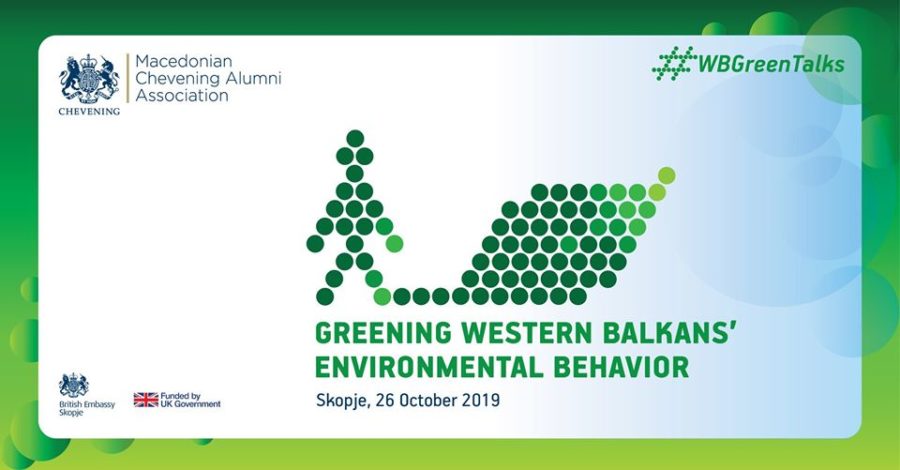When it comes to tackling any of the environmental threats that humanity is faced with today, the first key challenge is to raise the awareness of the problem and the need for change of behaviour. This is a worldwide quest, and definitely not unique to the Western Balkan region. However, it is evident that Western Balkan countries are lagging behind in this process, and that they have many common issues to overcome.
That is why we decided that the focus of the annual Macedonian Chevening Alumni Association (MCAA) conference this year should be exactly “Greening Western Balkan’s environmental behaviour”. We tried to tackle the key environmental awareness raising drivers from all relevant perspectives, beginning with the classical approach, and closing with the modern drivers and future paths.
It was really a rewarding feeling to see a full room of guests at the day of the event, after so many hours of preparations and bringing 12 speakers from the region, but also UK and Mexico, trying to exchange as many good practices and experiences as possible. We’ve had Chevening alumni and friends at the panel, coming with a background in environmental law, CSR and sustainability, social marketing, green architecture, education, climate action and energy, innovation, experimental biology, campaigning and community engagement.
The main message that was conveyed through the whole #WBGreenTalks was that the causes for environmental damages are individual, but that the solutions must be built together as a society. The talks of all the different speakers coming from very versatile fields showed how it is necessary that all tools at hand are used at once. It is absolutely necessary that every expert tries to implement the environmental perspectives within its field of work and contributes towards more sustainable future.
The first panel that was deconstructing the classical approaches in environmental awareness raising showed that policies and laws are a big driver, however they have to be accompanied by education of the population and financial support for the companies and industry. When key legal professionals try to challenge big environmental issues in front of the courts, that can also result with raising environmental awareness among people and authorities.
Green education has to be introduced as early as possible, cause the feeling of respect and responsibility towards the environment is established since youngest age.
It is interesting that there are many companies that try to implement environmental perspectives and CSR policies in their marketing and working strategies, however the WB market is not that sensitive to their efforts, and it is of utmost importance that the governments push forward and subsidize these steps.
Social marketing is one fresh tool that could play a big role in shaping public opinion, cause very often people’s behaviour is predetermined by its surrounding and not just by its awareness.
However, well thought strategies and policies are crucial for the transition to clean energy of the WB
as a coal region, and civil engagement is decisive for the just overcome of these challenges.
When it comes to working with communities, tailor-made approaches are the most effective ones, and only by working hand in hand with the locals and creation of feeling of trust, pro-environmental behaviour can be embraced.
In a special and carbon-free video talk, our Chevening Alumni from Mexico presented the tools of behavioural science, namely how behavioural insights can be very effective in promoting environmental laws compliance among people. The keynote session was completed by the first ever talk given by Greenpeace in North Macedonia, who shared experiences around community building in Coal Regions in Bulgaria.
The second panel showed how the future can be greener only by using innovative and interdisciplinary approaches. That requires creating synergies between smart technologies and green architecture in tackling environmental challenges and achieving zero carbon emissions. However sometimes even existing infrastructures and solutions can become effective by their innovative promotion and redesigning. What’s important is to create social inclusion and set right examples. Often people are not against green action, but lack knowledge of it. They need to understand their role, even if that means going door-to-door and getting them on board.
Lastly, green jobs need to be understood in broader sense and promoted as right future careers for young generations. It is only then, that we can expect a shift of our reality, into a bright green future.

